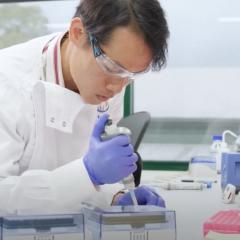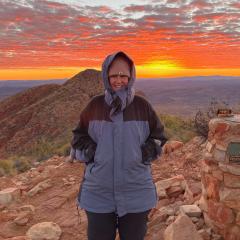An international fertility expert hunting for the building blocks to “good eggs” is bringing his research to a new laboratory at The University of Queensland.
Professor Hayden Homer will lead the new UQ Oocyte Biology Laboratory at the Centre for Clinical Research(UQCCR), where he will drive research that could help women in their late thirties have children.
Female fertility declines with ageing due to a decline in the quality of the oocyte, the cell in the ovary which can become the ovum (or egg) ready for fertilisation.
“I aim to better understand the essential building blocks for making a good egg,” Professor Homer said.
“This information is critical for understanding why it becomes increasingly difficult for eggs to produce healthy pregnancies as women get older, and for developing novel treatments that can help women in their late-thirties and beyond to have a family.”
Infertility affects 1 in 6 couples of reproductive age in Australia.
“While in-vitro fertilisation (IVF) is a very effective option for many, it doesn’t help everyone. Oocyte biology offers us another avenue of options to help couples to conceive.”
UQCCR Acting Director Professor Greg Rice said the appointment was a great win for the team, as Professor Homer has been recognised internationally for his expertise in reproduction and fertility research.
Professor Homer is a clinician scientist, meaning he undertakes research alongside practice as a fertility specialist.
He holds the Christopher Chen Chair in Reproductive Biology and was previously co-director of The University of New South Wales’ Oocyte Biology Research Unit.
Before moving to Australia in 2014, he was a senior lecturer and consultant sub-specialist in reproductive medicine at University College London (UCL) where he was clinical lead for IVF and recurrent miscarriage as well as academic lead for mammalian oocyte research within UCL’s Institute for Women’s Health.
Professor Homer held fellowships from WellBeing of Women (the research charity of the UK’s Royal College of Obstetrics and Gynaecology) and the Wellcome Trust in the UK.
He has received numerous prizes and awards, including the prestigious Medical Research Society/Academy of Medical Sciences Young Investigator Award.
Since relocating to Australia, he has secured over $1 million in National Health and Medical Research Council funding for projects he is leading.
Professor Homer’s work has led to new discoveries that have been published in the world’s premier journals including : Science, Genes & Development, Nature Cell Biology, Development and Developmental Cell.
Recently, Dr Homer applied a powerful new genetic technology to human oocytes for the first time, and published one of the foremost handbooks on mammalian oocyte research.
Professor Homer wrote this piece for The Conversation in 2013: New fertility treatment brings hope, but not for all.
Media: Professor Hayden Homer, 07 3346 5024 or h.homer@uq.edu.au; Jenny Johnston, Marketing Communications Officer, UQ Centre for Clinical Research (UQCCR), 07 3346 6041, 0438 753 471 orj.johnston2@uq.edu.au.



